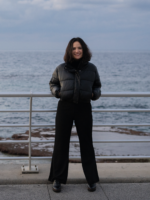Poem of the Week | March 02, 2015
Todd Davis: "Fire Suppression"
This week we’re delighted to offer a new poem by Todd Davis. Davis is the author of four collections of poetry—In the Kingdom of the Ditch, The Least of These, Some Heaven, and Ripe—as well as of a limited edition chapbook, Household of Water, Moon, and Snow: The Thoreau Poems. He edited the nonfiction collection, Fast Break to Line Break: Poets on the Art of Basketball, and co-edited Making Poems: Forty Poems with Commentary by the Poets. He is the winner of the Gwendolyn Brooks Poetry Prize and the Chautauqua Editors Prize. He teaches creative writing, American literature, and environmental studies at Pennsylvania State University’s Altoona College.
Author’s note:
While fishing and hiking in Montana in August 2013, I was aware each day of the threat of wildfires that were burning fifty miles away. It was only a month after 19 firefighters were killed in the Yarnell Hill Fire in Arizona, and the smoke that drifted over my head became a space of empathy and imagination that mixed with my desire for that tragedy to be rewritten.
The history and policy of fire suppression in the United States has not always made ecological sense. Many species need fire to regenerate; the age and species diversity of a forest is affected by periodic fire as well; and fire ultimately helps reduce dead-wood resources, maintaining a balance that can help to prevent giant wildfires.
But the firefighters who risk their lives to contain wildfires do not make the policies that radically alter the kinds of conflagrations they will face. The work they do is immediate and dangerous and saves the lives and property of many people.
I suppose mixed into all of this is Aldo Leopold’s admonition to “think like a mountain.” That’s what all those other lives are doing in this poem, running with me and around me and toward what might save all of us…
Fire Suppression
SEE THE ISSUE
SUGGESTED CONTENT

Poem of the Week
Apr 22 2024
“Faith” by Nur Turkmani
“Faith” by Nur Turkmani is our Poem of the Week. Nur Turkmani lives in Beirut and researches social movements, gender, displacement, and agriculture. Her writing appears in West Branch, The… read more

Poem of the Week
Apr 15 2024
“Love Poem for Lois” by Regan Green
“Love Poem for Lois” by Regan Green is our Poem of the Week. Regan Green grew up in Columbia, Tennessee, and now lives in Baltimore. She is a junior lecturer… read more

Poem of the Week
Apr 08 2024
“Gray” by Melissa Ginsburg
“Gray” by Melissa Ginsburg is our Poem of the Week. Melissa Ginsburg is the author of the poetry collections Doll Apollo (winner of the Mississippi Institute of Arts and Letters… read more

